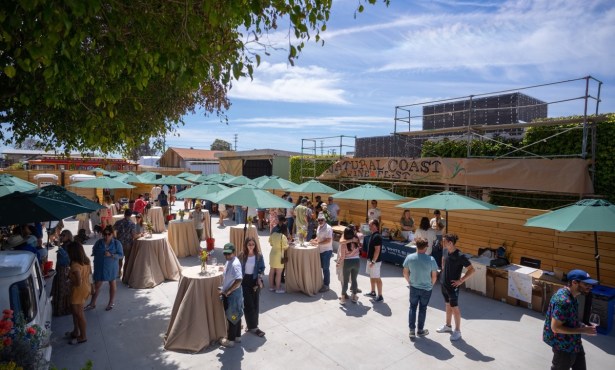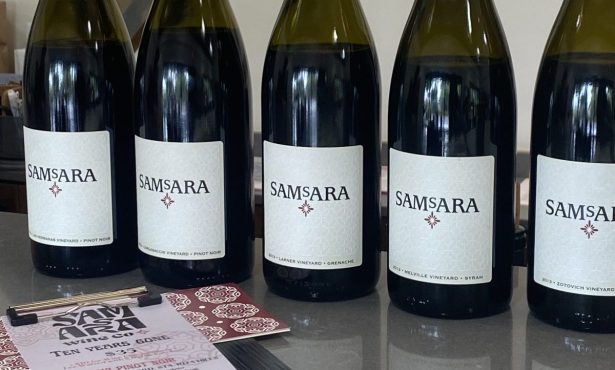Report from Wine & Weed Central Coast
Lots to Fear in Nascent Cannabis Industry, But Hope for Collaborative Future
There will always be more questions than answers surrounding the cannabis industry so long as marijuana remains illegal under federal law. But the Wine & Weed Symposium – Central Coast provided at least flashes of clarity for the more than 200 attendees at San Luis Obispo’s Embassy Suites on Thursday, May 10.
What’s clear is that the rules are constantly changing and vary widely from town to town — but if you plan on mixing your wine business with weed, you’d better step very carefully, as that crossover territory remains either illegal or, at best, extremely murky.
The one-day event began with an overview of cannabis in California, featuring Hezekiah Allen of the California Growers Association and Aaron Smith of the National Cannabis Industry Association. After opining that marijuana should be considered an “agricultural medicine, not a pharmaceutical medicine,” Allen outlined his organization’s efforts: the establishment of marijuana-growing appellations, like what’s done in wine, will happen by 2021; the fight to allow growers to sell directly to consumers, rather than only through licensed retailers; and, in what became a common issue throughout the day, tax reform.
Based on the state’s initial, and overly ambitious, tax projections — they projected more than $80 million for the first quarter of 2018, but only $34 million came in — Allen explained, “We are underperforming every other state that’s ever done this.” That means the black market is thriving, with eight times more cannabis being exported to the Midwest and East Coast than what is consumed in California.
Representing 1,500 cannabis businesses across the country, with members in all 50 states, Smith said the NCIA’s goal is “to exert our collective influence to change federal laws.” He discussed an upcoming bipartisan bill — proposed by Senator Cory Gardner, apparently supported by President Donald Trump, at least in private — that will give legal-marijuana states more clarity to operate while “not shoving legalization down the throat” of states that don’t want it.
Senator Chuck Schumer is also introducing a bill to “deschedule” marijuana, removing cannabis entirely from the list of regulated drugs. But Smith said there will be pushback against that, even from within the cannabis industry, where some major players would prefer to see marijuana rescheduled to a Schedule 3 drug, like opioids. “That would pharmaceuticalize the product,” said Smith, who, like most in the room, did not think that would be good idea.
In responding to a question from the crowd about hemp versus cannabis, Allen replied, “I love cannabis, but hemp is going to change California….Hemp can do everything an almond can,” he explained, but the turnaround is 90 days for the first hemp crop versus 11 years for almonds.
The next panel featured the state’s top legal experts in all things cannabis. It was a bit of a buzzkill, revealing both how illegal cannabis still is when it comes to all things federal, how prohibitive the state laws are on many aspects of production and consumption, and how much danger wineries could get into if they ventured into cannabis blindly.
“Your business is built one quicksand,” said attorney Hilary Bricken at the start. She explained that the state laws are riddled with gaps, so local municipalities are trying to fill them, but also breaking other state laws in the process.
“Recovering” attorney Amanda Ostrowitz, who founded Cannaregs as a clearinghouse for California’s many cannabis rules, broke down the rules in San Luis Obispo County alone, which run from very progressive, such as Grover Beach, to very conservative Atascadero. Smart municipalities are already adjusting their high tax rates to be more amenable to business. “The tax rates are extremely high, and the black market is thriving,” she said.
Attorney Rebecca Starney-White was blunt when it came to crossing over from wine to weed. “What I tell wineries is that you have something to lose,” she explained, noting that there were some bills forthcoming that sought to clarify certain issues, but were likely to make them stricter. What’s very clear is that it remains illegal to combine cannabis and alcohol, both by state and federal law.
As for growing cannabis, Bricken explained that, if vineyard owners were to start growing pot, they should get lot line adjustments or subdivisions, and make a separate entity in case the feds decided to seize the land. And given that Attorney General Jeff Sessions issued a memo in January empowering his staff of U.S. District Attorneys to go after cannabis, Bricken explained, “Forfeiture is a tool that they love. A free and clear vineyard plus grow? A lovely target.”
Events with cannabis are another cause for concern. In short, they aren’t really legal, especially if they are profit-seeking. There’s a “lot of chaos,” said Bricken, noting that many municipalities are allowing them against state law. “It’s very strict but no one is following the rules.” No one seems to be enforcing them either. Making it very clear that she was not offering legal advice, Starney-White said, “Do your events now before the crackdown comes.”
They also discussed how the federal prohibition of cannabis plays into the landscape in forgotten ways. The Bureau of Reclamation, for instance, could shut off water to cannabis growing properties, and electricity providers are also subject to federal rules. Same with the Williamson Act, in which property owners get tax breaks for remaining in agriculture, but only federally legal farming.
The one bright light was tourism. “Tourism is another great place to play that’s not gonna land you in federal prison and might actually be profitable,” said Bricken.
With so many woes, it was a wonder why anyone enters this game by the end of this panel. “Who’s making the money?” asked Bricken. “It’s the ancillary companies. Who won the Gold Rush? It wasn’t the prospectors. It was the people selling pick axes and shovels.”
The rest of the day featured more panels on the business of cannabis and predictions on what the future will hold, as well as an inspiring discussion about cannabis and wellness by Pamela Hadfield, the co-founder of HelloMD.



